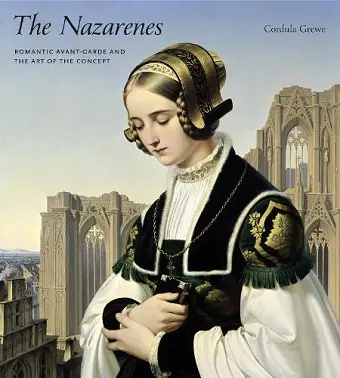The Nazarenes
Romantic Avant-Garde and the Art of the Concept
Format:Hardback
Publisher:Pennsylvania State University Press
Published:23rd Apr '15
Should be back in stock very soon

In The Nazarenes, Cordula Grewe presents a timely revisionist account of the Nazarenes, a group of early nineteenth-century German artists who have been occasionally reviled, but more often ignored, in the history of modern art. Viewing critically the effects of a century of skeptical Enlightenment and decades of political revolution, the Nazarenes committed themselves to a reenchantment of the modern world and a revitalization of contemporary art through a return to the plainspoken piety and stylistic simplicity of medieval and early Renaissance art. The Nazarene style soon became commonplace across Europe and the United States, and its popularity in Bible illustrations and devotional print culture continues today. Despite, or perhaps because of, this success, modern accounts have commonly dismissed this art as hackneyed, kitsch, or hopelessly conservative. Grewe argues that such dismissal overlooks the complexity and quintessential modernity of the Nazarenes’ revivalism. Exploring the Nazarenes’ vanguard beginnings, Grewe considers their intellectualized approach to art and art-making in the context of the longer history leading up to conceptual art. Tracing what Grewe calls the Nazarenes’ “art of the concept,” a phrase that instructively labels an encompassing history in which to situate the origins of the conceptual art movement, The Nazarenes reveals an alternative side of modernity, one manifested in a historicism born from religious revival, a side well explored in the fields of history and sociology but, until now, largely ignored by art historians.
“This beautifully produced and written book provides an overarching history of a misunderstood and easily pigeonholed group of artists. But Cordula Grewe goes on to mount an impressive project of historical understanding that makes the Nazarene artist group accessible by returning them to the history of art, from which they have been largely absent. Grewe challenges the reigning conception of modernity to make room for something modernist critics have been happy to use as a foil. In the end, she argues that the artists who preferred thought to materiality turn out to have been precursors of very modern conceptual art.”
—David Morgan, Duke University
“Revisions of modernism seem perpetually in the works these days. But there is perhaps none more persuasive and stimulating than Cordula Grewe’s The Nazarenes. An exciting new history of this nineteenth-century Germanic movement—and a rare one in English—the book’s narrative offers a fresh critical take on the Nazarenes’ retrospective vanguard art. Along the way, Grewe convincingly places the Nazarenes at the beginning of a genealogy of conceptualism in art, arguing for the lasting effects of their self-reflective picture theory.”
—André Dombrowski, University of Pennsylvania
“In this engaging and thought-provoking study, Cordula Grewe challenges the commonly held view that the Nazarenes were conservative and outmoded in comparison to the innovations of the avant-garde. Grewe complicates this simplistic binary narrative by proposing an important reappraisal of their conceptual art practice as antimodernist and vanguard, communal and individual, traditional and innovative. This book puts forward a nuanced reading of the Nazarenes in their artistic, political, and cultural contexts. In doing so, Grewe offers an important rethinking of modernist art practices and their critical reception from the nineteenth century to today.”
—Mitchell Frank, Carleton University
“Cordula Grewe's bold and provocative book reconstructs the fascinating intellectual world of the Nazarenes, whose art was eminently successful and influential in the nineteenth century but is today largely neglected. Her impressive study of this philosophically ambitious movement reveals that in modern art a yearning for aesthetic simplicity and naïveté is always the result of complex constellations of ideas. In an innovative combination of meticulous readings of images with a reconstruction of the genealogies of modern art, Grewe proves that the history of the European avant-garde begins with the Nazarenes’ ideational ‘art of the concept.’ Deconstructing the conventional view of the Nazarenes, she deepens our understanding not only of the art history of the nineteenth century, but also of the modern and the postmodern. This is a book that opens the reader's eyes to the invisible in the visible.”
—Ernst Osterkamp, Humboldt-Universität zu Berlin
“This magisterial text, by the foremost international authority on its subject, is without doubt the most probing and richly nuanced account of the role of the Nazarenes in the history of art in any language. Grewe draws the Nazarene project, its generational shifts and conflicts, into the sharp and detailed focus that was a hallmark of the group’s earliest productions. The text’s special emphasis on the theoretical, even philosophical, aspirations and implications of the group’s work is balanced by attentive, often inspirational, readings of individual images. It is a happy testimony to the obsolescence of reductive modernist histories of the nineteenth century that few, if any, readers will want to contest Grewe’s assertion of the essential modernity of the Nazarenes, nor their status as perhaps the first of the historical avant-gardes.”
—Tim Barringer, Yale University
“The product of searching analysis as well as passionate advocacy, this study is a revelation. Cordula Grewe encompasses the whole field of Nazarene activity, from vast fresco paintings to intimate portraiture and sublime landscape lithography. There can no longer be any justification for neglecting this prescient ‘art of the concept.’”
—Stephen Bann, University of Bristol
“After two centuries of negative critical reception of this artistic movement, [this book] presents a compelling revisionist account that succeeds in recapturing the radicalism of what Johann Wolfgang von Goethe disdainfully described in 1817 as ‘neo-German, religious-patriotic art’.”
—Frédérique Baumgartner Burlington Magazine
“The most penetrating treatment of this important movement in any language. Profusely illustrated, beautifully produced, and a pleasure to read, The Nazarenes is at once a global analysis of these artists’ creations and aims, and a wide-ranging polemic about the field of art history today.”
—Joseph Leo Koerner CAA.Reviews
ISBN: 9780271064147
Dimensions: 254mm x 229mm x 36mm
Weight: 1950g
400 pages